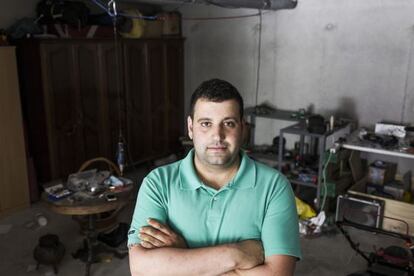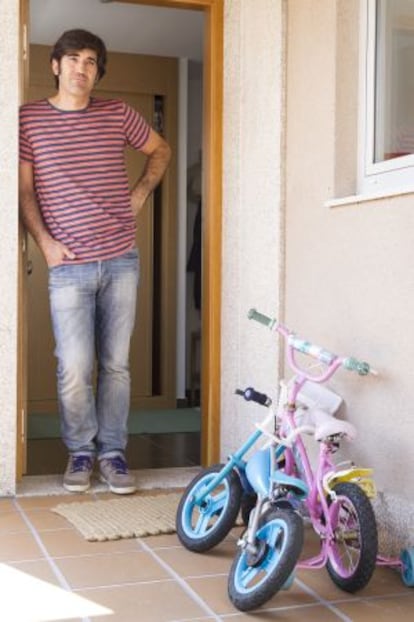¡°I had 130 work contracts in two years¡±
The number of Spaniards being hired for jobs lasting less than a week is rising Many live an insecure existence, without vacations or sick pay, waiting for the phone to ring

The average Spaniard¡¯s working life is usually made up of between five and seven jobs. But, at just 32, David Pena has already built up a stack of contracts the thickness of a Russian novel. In just two years this Galician man has registered and de-registered with the Social Security system a total of 130 times. Some of these contracts lasted just a week, or even two hours.
¡°One time I was hired on a one-hour contract and I ended up working 24 hours,¡± he laughs as he recalls one of his past jobs from the kitchen of his home in Villestro, located on the outskirts of Santiago de Compostela, where he lives with his mother, who is disabled and cannot work, and his 71-year-old aunt.
There has to be a judicial order that determines their status¡±
Pena is a jack-of-all trades. He can set up performance stages, transport goods, work as a door-to-door salesman for power utility providers, unload trucks, and carry whatever needs to be carried on his sprawling shoulders.
He is the typical part-timer, bogged down by a situation that is dragging back the Spanish job market.
Hundreds of thousands of people walk in and out of Spain¡¯s Social Security offices on a daily basis. A quarter of the contracts that have been signed so far this year (1,333,837 out of 5,476,901) are for less than a week¡¯s work. Only 7.9 percent of contracts signed last month were permanent.
None of these temporary workers can make any plans, go on vacation, get sick, take out a mortgage or even think about accumulating enough Social Security contributions to have an adequate pension when they retire.
The part-time plague
Temporary work has grown since 2006. Contracts lasting a week or less made up 14.7% of all those signed in 2006. The following year that proportion grew to 15.1%, and has continued to rise ever since.
Contracts lasting less than a week. These types of jobs are more common in 2015. About 24.4% of Social Security affiliations this year are tied to contracts that last less than a week.
More short-term jobs registered as part-time. In this case, the percentage has grown to 28.7%. While there has been a 48% increase in the number of full-time contracts valid for seven days or less, there has been a 123% increase in the number of short-term jobs paid by the hour.
But at the same time, they cannot reject any new offer of employment if they don¡¯t want their names and phone numbers taken off the job bank list.
These 21st-century workers are condemned to follow an agonizing and uncertain set of rules for temporary employment.
David studied computer science and then worked as an airport baggage handler for a period. Now he knows how to do just about anything. He has even cleaned out stables on one-day contracts, working shifts between 3am and 6pm. ¡°In the end, I was paid €50 a day. I know I have no vacation days coming to me, just days that I don¡¯t get paid,¡± he says.
With what he earns and with the €400 disability check his mother collects, the three get by. But it can be worse, like the time when he broke his leg in an accident and couldn¡¯t work at all.
At one point, his phone rings. ¡°Sure, of course, Saturday,¡± he tells the caller. He has just been hired to set up a stage at a theater ¨C two days¡¯ work that means two Social Security affiliations and two other visits to take his name off the rolls. He can¡¯t understand why they cannot put the two stints together in one contract.
Even a job inspector, interviewed for this article, was perplexed. ¡°Very short-term contracts only go to prevent any risks,¡± he says. ¡°But they have no immediate economic benefit.¡±
Such contracts work out well for employers, even if they sometimes have to pay a little more in Social Security contributions, but they have ruined the Spanish job market.
You try your best so that they will keep you, even though they are only paying you €1,000¡±
The healthcare field, in particular, is saturated with contracts lasting only a few days. For years, thousands of nurses and nursing assistants have been tied to a substitution list that, from one day to the next, forces them to fill in vacancies for short periods. They earn little and usually get paid late, and never know when they will be called.
Pilar, 37, and Mar¨ªa, 38, have been working like this for years at the Meixoeiro hospital in Vigo. Pilar has one child and Mar¨ªa is the mother of two. Between the two of them, they have had around 35 contracts over the last year.
¡°You can¡¯t turn anything down,¡± says Mar¨ªa, ¡°because if you do, your name will drop down 500 spaces on the jobs list.
¡°They once called me to La Ca?iza [over 50km from Vigo] to fill the 8am to 1pm shift. Just one shift. With transport costs and paying someone to help you at home, you end up losing money.¡±
The majority of the contracts are on the fringes of legality. In reality, these employees can be formally considered as permanent workers who are discontinued, or permanent part-timers. ¡°But there has to be a judicial order that determines their status,¡± states the work inspector.

There have been complaints, but the problem is that it is sometimes better just not to say anything.
The two nurses say the worst thing about their situation is the instability. They have to spend the whole day glued to WhatsApp. ¡°My parents are retired, but I cannot enjoy my free time with them because if my phone rings and I then have to go and help out,¡± says Pilar, who has a six-year-old son. ¡°You can never spend any holidays with your family.¡±
Her working life forms part of the porous fabric that makes up the Spanish job market, which is unable to take in the country¡¯s 4.2 million unemployed and is blighted by this out-of-control part-time philosophy.
Pilar is one of the many statistics that the government uses to show that thousands of new contracts are being signed each month. ¡°Those numbers do not show the reality,¡± she says. ¡°They are only statistics. People have children and have the bad habit of having to eat three times a day.¡±
Few business owners want to get tied down with long work contracts ¨C even the labor reform, which has made it cheaper to fire people, has failed to push them into formalizing their workers¡¯ job situations.
Luis Pe?a, 40, works as a video editor for public television. In six months, he has had 30 contracts. Sometimes he finds it is not worth his while going to fill a job and paying a babysitter to take care of his two daughters.

¡°Everything is provisional,¡± he says, as his two young daughters play in the living room at his home. ¡°The only thing I can do is just keep going, but we can¡¯t stay like this for the rest of our lives.¡± As with the other people interviewed for this article, Luis is unable to take vacations.
The majority of people tied to these contracts are trying to fill their dream of finding work related to what they studied or something that interests them. Everyone interviewed has some formal studies.
Daniel Unzueta, 33, an actor and communication specialist who has registered with the Social Security system 30 times in the past 12 months, has not lost hope that he will find a job that fits his background. But it gets harder each day to maintain a good attitude.
¡°You try your best so that they will keep you, even though they are only paying you €1,000 a month,¡± he says. ¡°But the recognition never comes and they let you go. And this is what causes you to think about accepting other types of job offers.¡±
The process of trying to find a job then becomes an obsession. Sometimes he gets up in the middle of the night to send off his r¨¦sum¨¦ to a company whose name has suddenly popped into his head ¨C something that allows him to think beyond the next two days, and give him some hope that he might one day put an end to this heavy burden of temporary work.
Tu suscripci¨®n se est¨¢ usando en otro dispositivo
?Quieres a?adir otro usuario a tu suscripci¨®n?
Si contin¨²as leyendo en este dispositivo, no se podr¨¢ leer en el otro.
FlechaTu suscripci¨®n se est¨¢ usando en otro dispositivo y solo puedes acceder a EL PA?S desde un dispositivo a la vez.
Si quieres compartir tu cuenta, cambia tu suscripci¨®n a la modalidad Premium, as¨ª podr¨¢s a?adir otro usuario. Cada uno acceder¨¢ con su propia cuenta de email, lo que os permitir¨¢ personalizar vuestra experiencia en EL PA?S.
En el caso de no saber qui¨¦n est¨¢ usando tu cuenta, te recomendamos cambiar tu contrase?a aqu¨ª.
Si decides continuar compartiendo tu cuenta, este mensaje se mostrar¨¢ en tu dispositivo y en el de la otra persona que est¨¢ usando tu cuenta de forma indefinida, afectando a tu experiencia de lectura. Puedes consultar aqu¨ª los t¨¦rminos y condiciones de la suscripci¨®n digital.









































